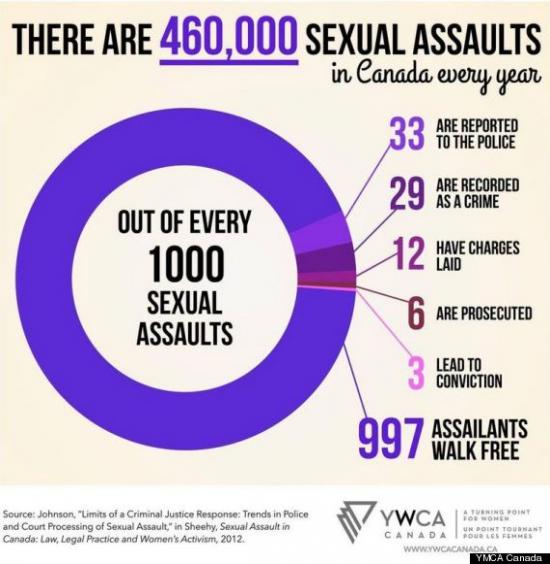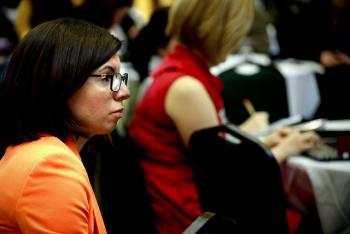To the members of the Conservative caucus who voted against M-444, the National Action Plan to End Violence against Women,
There's no doubt that you've heard, in the past year, about the numerous incidents of sexual violence and harassment faced by women in this country. You've heard about former CBC radio host Jian Ghomeshi, who has now been charged with several counts of sexual and physical assault. You've heard about the misogynist Facebook group started by thirteen male students of the 2015 Dalhousie Dentistry class.
You've heard about Rinelle Harper, who narrowly escaped death after being assaulted and left for dead near the Assiniboine River, and you've heard the fact that Indigenous women and girls are four-and-a-half times more likely to be the victims of violence than non-Indigenous women and girls in this country. You've heard about Marlene Bird, who was brutally assaulted in Prince Albert, Saskatchewan. You've heard countless calls from Indigenous communities and external organizations (such as the United Nations and Amnesty International) for Prime Minister Harper to call an inquiry into Murdered and Missing Indigenous Women. You've no doubt heard that he has recently stated that an inquiry is currently "not a priority."
You've heard about allegations of sexual harassment in your own workplace, the kind experienced by female politicians on Parliament Hill. You've heard former Supreme Court Justice Madame Marie Deschamps' recent report on sexual violence within the Canadian military, and you've heard about the misogyny and sexism faced by female journalists in the Canadian media. You've heard about the ongoing class-action lawsuit against the RCMP.
You've heard about the harassment faced by an award-winning anti-violence educator, Julie Lalonde, during her presentations last fall at the Royal Military College in Kingston. You've heard the CBC investigation into inconsistencies in reporting sexual assaults on Canadian college and university campuses.
You've continued to hear about the stories of Amanda Todd and Rehteah Parsons, whose deaths are a profound reminder of the incredible toll that sexual extortion and sexual assault can have on young women. This past December, as Canada marked the 25th anniversary of the massacre at Montréal's École Polytechnique, you've heard the stories of both the survivors and the loved ones of the victims.
These stories are a lot to take in, and these are just the ones that have captured significant national attention. I'm sure that within each of your ridings or your communities, you've heard of similar stories of violence. Given the fact that one in three Canadian women will face sexual assault in her lifetime, it is also very likely that those you know have been directly affected by violence.
And yet, all but one member of your caucus -- which includes the Minister for the Status of Women, Kellie Leitch; the Minister of Health, Rona Ambrose; and the (outgoing) Minister of Justice, Peter MacKay -- voted against M-444, a bill sponsored by NDP's Critic of Aboriginal Affairs, Niki Ashton.
All but one.
After the year we've just had? You've got to be kidding me.
I can already hear the rationales: that there are existing programs in place, that some federal funding has already been allocated, and that provinces have their own responsibilities in terms of addressing both funding and policy issues. This may all be true, but it doesn't erase the necessity of federal leadership and commitment. To be sure, provinces haven't exactly been waiting on your Conservative government to make changes. With the recent leadership of Premier Kathleen Wynne, Ontario has been given a $41-million commitment to anti-violence initiatives and gender equity projects, which includes a multimedia campaign, training for front-line workers, funding for sexual assault crisis centres, free legal advice to sexual assault victims, changes to legislation to aid sexual harassment complaints, and a revised sexual education curriculum.

But sexualized and gendered violence require more than individual provinces or communities mobilizing on their own. At the moment, many provinces face the chronic underfunding of rape crisis centres and domestic violence shelters, and the inequity is particularly noticeable between urban and rural communities. In British Columbia, while the Liberals have recently released their "Violence-Free B.C." strategy (which was kickstarted with $3 million dollars received from civil forfeiture funds), the province is still suffering from the loss of critical funding for anti-violence services dating back to 2002.
Sexual assault centres are forced to spend time that could be better spent serving clients by fundraising: a significant portion of these organizations' budgets are now drawn from private donations. Underfunding also creates a massive backlog in the services that are able to be provided to victims, and as any front-line worker or anti-violence expert will tell you, timely access to support is critical in any survivor's process of recovery.
For instance, Vancouver-based rape crisis centre WAVAW (Women Against Violence Against Women) -- who also runs educational programs in schools -- currently reports a 1.5-year waitlist for individual counselling. These services provide critical support to all survivors, and limited access places undue burdens on individuals, particularly those who already experience marginalization within the system.
With the recent spotlight on sexual violence on college and university campuses, it's also painfully obvious that Canadian students are lacking a consistent set of policies and pieces of legislation that they can access in order to deal with sexual assaults, including individual institutions' failures to properly address assaults on their campuses. While American students can theoretically turn to Title IX (a 1972 bill which requires gender equity in educational programs which receive federal funding) or the Clery Act (a 1990 law which mandates the reporting of violent crime on federally-funded campuses) to hold their institutions accountable, Canadian students have no such federal legislation or protection. Indeed, at the federal level, Canada is lagging far behind. As MP Niki Ashton has noted, "a National Action Plan to Address Violence Against Women has been enacted with great success in countries like Australia, the United States and the United Kingdom."
I'm not saying that federal initiatives are perfect. As I know from fellow activists in the United States, legislation such as VAWA, Title IX, and the Clery Act still fail to be implemented properly, and survivors of sexual assault still face an uphill battle. At this point, for instance, nearly 100 American schools are under investigation for Title IX violations. So, too, while the White House's "It's On Us" campaign -- which features strong involvement from both President Barack Obama and Vice President Joe Biden -- is limited and very problematic in some ways (insofar as it fails to address male, queer, and trans survivors), I have to say that the difference between one country's leader being vocal about the issue of sexual violence, and the halfhearted shrug of Prime Minister Harper's "it's not a priority" is fairly damning. Add in the fact that all but one of your caucus members has voted to defeat M-444, and you've got a whole lot of disappointment.
If I'm going to be honest with you, I'm not surprised.
In fact, like many other survivors of sexual assault, and like many other Canadian women, I'm used to it. It's a familiar sentiment: don't worry, you're not the first and certainly not the last to disappoint. It's disappointing that out of every 1000 sexual assaults, only three result in a conviction. It's disappointing that access to psychological services in the private sector is so expensive, and that the underfunding of public programs means that many survivors of violence must wait a year or more to access support.
It's disappointing that many of us live, work, and play in a culture where misogyny is rampant, and where far too many victims (regardless of their gender or sexuality) are violently blamed for their own assaults. It's disappointing that there is so little focus on the violence faced by Indigenous women, women of colour, trans women, immigrant and refugee women, and women with disabilities. It's disappointing, sickening, and infuriating that despite the statistics and stories, the lives lost and the lives irrevocably changed by violence, that it still isn't enough to convince our government that ending violence against women -- and supporting those affected -- is an urgent priority.
I cannot help but think of the words of Glen Canning, Rehtaeh Parsons' father, who powerfully stated that his daughter was not merely bullied to death, but "disappointed to death" by a system that more often than not, shows indifference and hostility to survivors, and in which support can be nearly impossible to access.
As this year's federal election looms, Up For Debate (an alliance of more than 175 women's organizations from across Canada) is asking "all political parties to commit to a federal leaders' debate on issues identified by women -- the first in 30 years, and to make meaningful commitments to change women's lives for the better, at home and abroad." Organizations and individual voters are mobilizing to make women's issues a priority.
As Kate McInturff noted in her recent rabble.ca piece on Canadian voting demographics, "Women aren't a special interest. They are half the population. They vote bigger than their demographics. And this week's polls suggest they are a moving target for political parties -- with female voter preference shifting significantly over the past four months."
McInturff writes that "women voters are paying attention to this election." With the defeat of M-444, the Conservative caucus has sent a big message to women in this country about its priorities.
Make no mistake: this is not just one small bill whose defeat will be quickly forgotten or forgiven.




Comments
Do
Don't